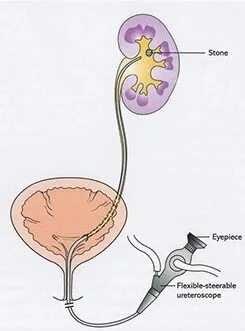Laser therapy is a modern, minimally invasive technique used to treat kidney stones, especially when other methods are not suitable. Here’s a look at the types of kidney stones that can be effectively treated with laser therapy:
1. Calcium Oxalate Stones
These are the most common type of kidney stones, forming when calcium combines with oxalate in the urine. They can be hard and brittle, making them a good candidate for laser fragmentation. The laser breaks these stones into smaller pieces, which can then pass through the urinary tract more easily.
2. Calcium Phosphate Stones
These stones form when calcium combines with phosphate in the urine. They are often larger and less dense than calcium oxalate stones, but laser therapy can still be highly effective. The high-energy laser breaks them into smaller fragments, facilitating easier passage.
3. Struvite Stones
Struvite stones, also known as infection stones, form in response to a urinary tract infection. They can grow quickly and become quite large. Laser therapy is particularly useful for these stones because it can break down the stones effectively, and it helps to address the infection that contributes to their formation.
4. Cystine Stones
Cystine stones are less common and form in people with a genetic condition called cystinuria, which causes excess cystine in the urine. These stones can be quite large and difficult to treat with traditional methods. Laser therapy can effectively break down these stones into smaller pieces, making them easier to pass.
How Laser Therapy Works
Laser therapy involves the use of a laser fiber inserted through a thin tube called a ureteroscope, which is passed through the urethra and bladder to the kidney or ureter where the stones are located. Once in position, the laser targets the stones, fragmenting them into smaller pieces. These smaller fragments are then either flushed out naturally or removed through the ureteroscope.
Benefits of Laser Therapy
- Minimally Invasive: Requires no major surgery, reducing recovery time and associated risks.
- Effective: Can fragment stones of various compositions and sizes.
- Precision: Allows for targeted treatment, minimizing damage to surrounding tissues.
Conclusion
Laser therapy is a versatile and effective treatment option for various types of kidney stones. It offers a minimally invasive alternative to more traditional surgical approaches, helping to alleviate symptoms and reduce recovery time for patients. If you have kidney stones, discussing treatment options with a urologist can help determine if laser therapy is right for you.





Comments